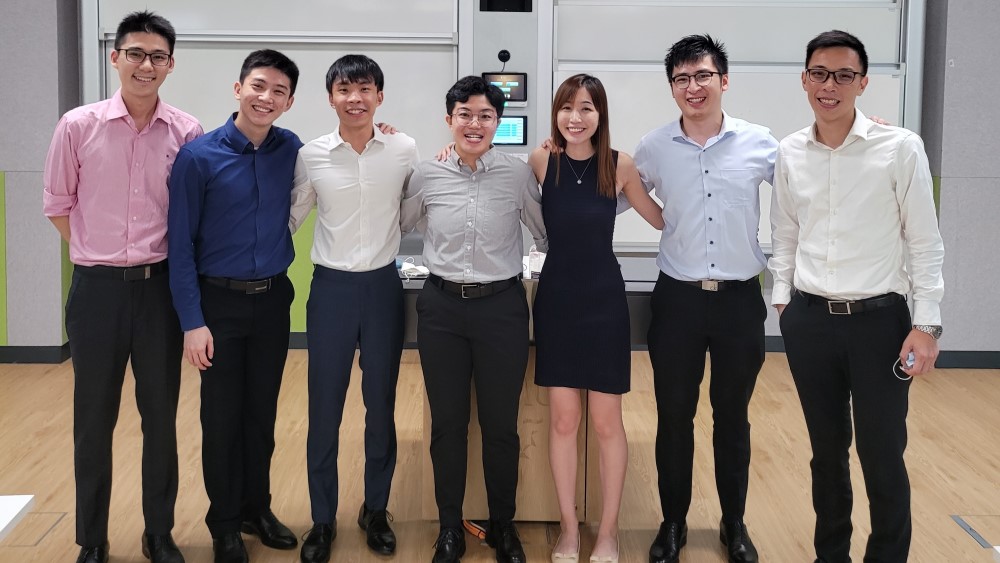How the SMU Second Major in Accounting Data and Analytics Kickstarted Careers
During their time at SMU, Mindy Boo and Colin Tay took up the Second Major in Accounting Data & Analytics, allowing them to hone coding and analytics skills. More importantly, the Second Major provided them with the fundamentals of analytics, helping them secure interviews and kickstart their careers.
Data Analytics is a buzzword in the business environment these days, and handling big data is regarded as an essential skill, especially for those in accounting. It comes with little surprise that possessing knowledge in accounting and data analytics makes one a valuable hire. As the accounting profession undergoes a digital transformation, such skilled talents are in short supply.
Today, we speak with Mindy Boo and Colin Tay, both SMU Bachelor of Accountancy (BAcc) graduates, to find out how their job searches and careers have been impacted by SMU’s Second Major in Accounting Data and Analytics (ADA).

A Corporate Development and Transaction Services Analyst at Accenture, Mindy’s work involves working closely with multiple stakeholders to understand client requirements to arrive at a competitive contract price through financial modelling and analysis while ensuring internal profits. She also plays the role of a business adviser, interpreting data for her stakeholders to evaluate how financials may be further optimised while mitigating potential risks.

As a Retail Credit Business Development Associate, Colin’s key responsibility at SeaMoney is acquiring and retaining customers from internal and external channels. To make informed decisions and provide greater customer satisfaction, he uses data analytics on processes such as improving user experience and product efficiency and strategies to optimise product profitability while achieving business scale goals. He also works with internal teams across various functions and regions to implement market research to understand trends better.
Q:
What motivated you to take up the Second Major in Accounting Data & Analytics (ADA) back in SMU?
A:
Mindy: Previously, I had interned at several companies and came to discover my interest in roles relating to analytics. The ADA Second Major offers a series of interconnected modules and gave a comprehensive view of the practical and technical aspects of analytics. As such, the major was attractive to me, as it would get me closer to my career goals by inculcating in me the relevant skillsets. For instance, through this major, you can opt to take up modules that teach you how to use software such as R, Python, SQL and Excel, which are common software skills that hirers look out for. The course structure of the ADA also provided opportunities to experience multiple analytics projects, making us more attractive to companies interested in hiring candidates with experience in this area.
Colin: I took up the Second Major in ADA in my second year at SMU. At that time, terms such as Big Data, Python, SQL and Data Analytics were gaining popularity, which piqued my interest in the subject. I was also fortunate to have supportive parents and siblings who encouraged me to seize the opportunity to pursue my interest.
In addition, the information sessions organised by SMU made me realised the potential of Data Analytics and how this was a beneficial skill set to have in the future. With everything pointing in one direction, taking up the Second Major in ADA came naturally to me.
Q:
Both of you did not have any prior experience in data analytics or programming before taking up the Second Major. What was the experience like for someone new to this field?
A:
Mindy: It may not be the easiest major as it requires you to concurrently learn the technical (i.e. statistics) and practical (i.e. coding) aspects of Analytics within a short time frame. However, it was manageable as we were provided with ample assistance, such as access to DataCamp resources and various software licenses to practise our software skills. It helped that the professors also welcomed our questions on complicated concepts or codes. On the whole, analytics is a heavy subject matter to cover as a second major. Hence, time, effort and self-initiative are needed if you intend to explore deeper and to maximise your learning experience.
Colin: Taking up this Second Major in ADA was the best decision I made in SMU. While it seemed daunting initially, SMU has a well-planned curriculum and many professors who are willing to listen and help their students along the way.
Considering that I had no prior experience in programming, I took it upon myself during the summer holidays to attend a coding course with my friends. This helped in courses such as Introduction to Programming. Knowing the basics of coding is a transferrable skill set. For example, I have used both Python and R in different modules. Knowing Python certainly aided me in my understanding of using R during the Statistical Programming module.
Even for those who have no intention in taking up additional courses outside, SMU has put an infrastructure conducive to learning. For instance, I relied solely on SMU’s resources to learn SQL and gained a strong foundation in this programming language.
My advice to prospective and current students considering the Second Major in ADA is – do not be afraid to learn, do not be afraid to fail but be afraid of missing out on gaining knowledge.
Q:
Did your Second Major in ADA have any impact on your job search? If so, what kind of impact?
A:
Mindy: Many job postings today emphasise the need for candidates who possess experience and knowledge in analytics. Therefore the Second Major played a key role in my job search because having the background increased my chances of being shortlisted for interviews. Additionally, during the job interviews, hirers often asked about my prior experience relating to analytics. Some jobs required applicants to take tests to assess a candidate’s coding skills.
At these interviews, I was able to share project experiences that I have been through and demonstrate the knowledge that I had gained through ADA, which positioned me well in the eyes of the hirers.
Colin: When I started to apply for jobs during my final semester, I noticed that many companies were looking for individuals with an analytics background. Many companies also require candidates to be well-versed in coding languages such as Python. Having had exposure to Python, R, SAS and SQL, with the right accounting knowledge and technical expertise, certainly gave me an edge over the other candidates.
During my interviews with potential employers, many of the interviewers were curious to find out more about my Second Major. In fact at my interviews with SeaMoney and another credit-rating MNC firm, interviewers posed many detailed questions relating to my Second Major. For instance, one of my interviewers at SeaMoney showed great interest in the credit rating project that I had done during my Statistical Programming module. This project involved the use of machine learning to help predict potential credit defaults. In the end, I found myself talking him through the entire project as the interviewer had a keen interest in this topic.
Another topic that often cropped up was the Accounting Analytics Capstone project. The capstone project was something many interviewers were interested in knowing more about as we were working with actual clients and used data analytics to solve a real-world business problem. On a side note, I am still proud of what my team and I achieved for our client, whose business was tremendously affected by the pandemic.

Q:
It’s been close to one year since you started in your current roles. How have you benefited from your knowledge gained in the Second Major in ADA?
A:
Mindy: In my current role, I am expected to generate financial models in Excel within a short timeframe, hence my financial models have to be flexible and efficient. The ADA Second Major has laid a strong foundation in my financial modelling skillset, which helped kickstart my first career as a financial modeller. Exposure to various coding platforms, such as R, Python and SQL under the major, has also opened up possibilities of writing new Excel formulas relevant to my work, even if I may not have learned it before. In addition, the Second Major has also strengthened my logical thinking skills such that I can code more efficiently and quickly. Given the steep learning curve in my organisation, the Second Major has proved invaluable in helping me to adapt quickly to my role.
Colin: My role requires me to analyse and interpret data to make data-driven decisions. On the surface, data may appear to be just numbers, but it can tell a story with deeper analysis.
Being a business development associate, I am tasked with analysing data, presenting my findings and making decisions that help to benefit the business. Hence, I find the knowledge that I have gained in the Second Major to be very applicable to the corporate world. Additionally, being exposed to different programming languages such as R, Python and SQL during the programme has certainly aided me in adjusting to the steep learning curve at work. All the knowledge and skills that I have built up over my four years at SMU have become very applicable in my current role.
Ultimately, the greatest takeaway I gained from SMU was being able to adopt an analytical mind and analyse things from different perspectives.
Discover how far the SMU Second Major in Accounting Data and Analytics can take you. Find out more here.





